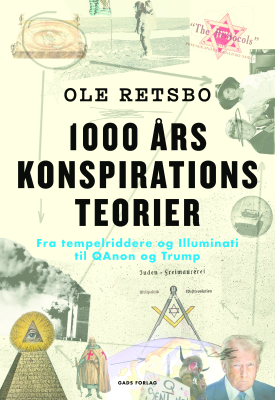
Conversations Among The Ruins
engelsk
Nyheder & politik
Begrænset tilbud
2 måneder kun 19 kr.
Derefter 99 kr. / månedOpsig når som helst.
- 20 lydbogstimer pr. måned
- Podcasts kun på Podimo
- Gratis podcasts
Læs mere Conversations Among The Ruins
My father's got a brilliant mind, but he keeps it hidden away in the backwoods of Tennessee. Join us as I unearth prophetic insights on culture and geopolitics from this hermit's cerebral matter.
Alle episoder
302 episoderIran War Update | The Rot of Western Elites | The Collapse of America
In this episode, Charlie and Peter discuss the latest signals regarding a potential war with Iran, including the meeting between Trump and Netanyahu and the deployment of the USS George H.W. Bush. We then zoom out to analyze the behavior of the U.S. as a "flailing hegemon," drawing uncomfortable historical parallels to the appeasement of aggressive powers in the 1930s. Finally, we explore the concept of "spiritual sickness" within Western elites, the Epstein fallout, and what a future Multipolar World might look like under China's rising influence. Timestamps:00:00 - Intro & New Clips Channel Announcement00:37 - Trump & Netanyahu Meeting: Is War Imminent?04:14 - Deploying the USS George H.W. Bush06:03 - The "Flailing" Empire: Historical Parallels to Athens & Rome08:45 - The Stalin/Hitler Parallel: Appeasing the Bully18:00 - Why US Decline is Uniquely Dangerous (Nuclear Hubris)23:15 - "Spiritual Sickness": Is the West Viewed as Satanic?29:48 - Why Western Citizens Won't Fight for Their Elites34:10 - Life After Hegemony: The Multipolar World40:23 - Will a Multipolar World Be Chaos or Cooperation?48:12 - Why China Has No History of Expansionism54:58 - The Cycle of Western Empire Collapse vs. Chinese Continuity1:00:46 - The "Depraved" Elite & The Failure of Western Democracy Go Deeper:Substack: https://conversationsamongtheruins.substack.com/ [https://conversationsamongtheruins.substack.com/] Support the Conversation:Join as a Member: https://www.youtube.com/channel/UCW9CSfmP6gEjqtOdGTD_JKw/join [https://www.youtube.com/channel/UCW9CSfmP6gEjqtOdGTD_JKw/join]Buy Me a Coffee: https://buymeacoffee.com/amongtheruins [https://buymeacoffee.com/amongtheruins] Listen & Watch:Spotify: https://open.spotify.com/show/3DJ12khDdM6t7o9AaktLu8?si=bd495e12062546fb [https://open.spotify.com/show/3DJ12khDdM6t7o9AaktLu8?si=bd495e12062546fb]Topic Videos & Shorts YT Channel: https://www.youtube.com/@AmongtheRuins-Clips [https://www.youtube.com/@AmongtheRuins-Clips] Socials:-X (Twitter): https://x.com/RuinsReport [https://x.com/RuinsReport]-Instagram: https://instagram.com/conversationsamongtheruins [https://instagram.com/conversationsamongtheruins]-TikTok: https://tiktok.com/@amongtheruins [https://tiktok.com/@amongtheruins]
Iran War Plan | Israel Annexes West Bank | The End of Zionism?
In this episode, we break down the potential for imminent war as Trump meets with Netanyahu. We analyze the dangerous escalation of "Tanker Wars," where the US is seizing ships carrying Iranian and Venezuelan oil—potentially crossing a red line with China. We also discuss the crisis of Western legitimacy, the fallout from the Epstein scandal, and whether Zionism is facing a permanent backlash in the US. Finally, we cover the Starlink situation in Ukraine/Iran and the recent military purges in China. Timestamps:00:00 Intro & The "Ruins Report" Clips Channel01:05 Trump, Netanyahu & The Push for War with Iran05:09 Tanker Wars: US Seizing Oil & Provoking China11:00 Internal Destabilization & The "1%" of Extremists16:00 The Epstein Scandal, "Baal," & Western Legitimacy21:00 De Facto Annexation of the West Bank24:56 The Rising Backlash Against Zionism33:00 Who Would Win a US-Iran War?40:37 Starlink in Ukraine & Intelligence Failures in Iran49:35 Economic Collapse & The Mystery of Gold Reserves51:35 Purges in the Chinese Military Leadership Go Deeper:Substack: https://conversationsamongtheruins.substack.com/ [https://conversationsamongtheruins.substack.com/] Support the Conversation:Join as a Member: https://www.youtube.com/channel/UCW9CSfmP6gEjqtOdGTD_JKw/join [https://www.youtube.com/channel/UCW9CSfmP6gEjqtOdGTD_JKw/join]Buy Me a Coffee: https://buymeacoffee.com/amongtheruins [https://buymeacoffee.com/amongtheruins] Listen & Watch:Spotify: https://open.spotify.com/show/3DJ12khDdM6t7o9AaktLu8?si=bd495e12062546fb [https://open.spotify.com/show/3DJ12khDdM6t7o9AaktLu8?si=bd495e12062546fb]Topic Videos & Shorts YT Channel: https://www.youtube.com/@AmongtheRuins-Clips [https://www.youtube.com/@AmongtheRuins-Clips] Socials:-X (Twitter): https://x.com/RuinsReport [https://x.com/RuinsReport]-Instagram: https://instagram.com/conversationsamongtheruins [https://instagram.com/conversationsamongtheruins]-TikTok: https://tiktok.com/@amongtheruins [https://tiktok.com/@amongtheruins]
War With Iran Inevitable | True Gaza Death Toll | Ukraine Assassination Plot
In this episode, Peter and Charlie discuss the grim reality of the war in Gaza, analyzing the IDF’s admission of 71,000 direct fatalities and why the true death toll—including indirect deaths—is likely much higher. They pivot to the upcoming meeting between Netanyahu and Trump, exploring whether the US is being maneuvered into a war with Iran and the leverage Israel may hold over the administration. Finally, they cover the assassination attempt on Russian General Alexeyev by Ukrainian intelligence and the normalization of political violence in modern statecraft. Timestamps:00:00 - Intro: Ignoring the Super Bowl for Geopolitics00:39 - IDF admits to 71,000 deaths: The real numbers (Direct vs. Indirect)08:30 - Media Numbing: Is the West erasing the Gaza Genocide?16:52 - Netanyahu meets Trump: Who is actually in charge?24:10 - The push for War with Iran: Israel’s strategy & US Armada29:18 - Donor Class & Blackmail: How policy is bought39:09 - Iran shifts from Defensive to Offensive posture48:13 - Immediate escalation risks: "This is going to blow"54:39 - Assassination attempt on Russian General Alexeyev (SBU Involvement)1:03:12 - "Catastrophic Success": The US adopting IDF tactics Go Deeper:Substack: https://conversationsamongtheruins.substack.com/ [https://conversationsamongtheruins.substack.com/] Support the Conversation:Join as a Member: https://www.youtube.com/channel/UCW9CSfmP6gEjqtOdGTD_JKw/join [https://www.youtube.com/channel/UCW9CSfmP6gEjqtOdGTD_JKw/join]Buy Me a Coffee: https://buymeacoffee.com/amongtheruins [https://buymeacoffee.com/amongtheruins] Listen & Watch:Spotify: https://open.spotify.com/show/3DJ12khDdM6t7o9AaktLu8?si=bd495e12062546fb [https://open.spotify.com/show/3DJ12khDdM6t7o9AaktLu8?si=bd495e12062546fb]Topic Videos & Shorts YT Channel: https://www.youtube.com/@AmongtheRuins-Clips [https://www.youtube.com/@AmongtheRuins-Clips] Socials:X: https://x.com/RuinsReport [https://x.com/RuinsReport]IG: https://instagram.com/conversationsamongtheruins [https://instagram.com/conversationsamongtheruins]TikTok: https://tiktok.com/@amongtheruins [https://tiktok.com/@amongtheruins]
Iran Calls America's Bluff | Sinking a US Carrier? | Russia Advances
Is the US sleepwalking into a nuclear war to save face in the Middle East? In this episode, we break down the collapsed talks between the US and Iran. We analyze reports that Washington's ultimatum ("It's this or nothing") backfired, leading to a dangerous standoff where Israel may be preparing its "Samson Option." We discuss the terrifying possibility of a US aircraft carrier being sunk, the incompetence of the negotiating team (Witkoff & Kushner), and the end of the START nuclear treaty. Finally, we pivot to the Ukraine War. Despite media silence, Russian advances are accelerating, the air war has intensified, and a recent assassination attempt on a Russian negotiator proves Kiev is doubling down on a war their own soldiers no longer want to fight. Topics Discussed: * Iran & Israel: The failed ultimatum and the risk of a "Samson Option" nuclear strike. * US Empire: The danger of US warships in the Gulf and the loss of global standing. * Nuclear Treaties: The expiration of START and the normalization of the apocalypse. * Russia & Ukraine: The acceleration of the Russian advance and the tragedy of forced conscription. 🏛 Go Deeper:Substack: https://conversationsamongtheruins.substack.com/ [https://conversationsamongtheruins.substack.com/] 🤝 Support the Conversation:Join as a Member: https://www.youtube.com/channel/UCW9CSfmP6gEjqtOdGTD_JKw/join [https://www.youtube.com/channel/UCW9CSfmP6gEjqtOdGTD_JKw/join]Buy Me a Coffee: https://buymeacoffee.com/amongtheruins [https://buymeacoffee.com/amongtheruins] 🎧 Listen & Watch:Spotify: https://open.spotify.com/show/3DJ12khDdM6t7o9AaktLu8?si=bd495e12062546fb [https://open.spotify.com/show/3DJ12khDdM6t7o9AaktLu8?si=bd495e12062546fb]Podcast YT Channel: https://www.youtube.com/@among_the_ruins [https://www.youtube.com/@among_the_ruins] 📱 Socials:-X (Twitter): https://x.com/RuinsReport [https://x.com/RuinsReport]-Instagram: https://instagram.com/conversationsamongtheruins [https://instagram.com/conversationsamongtheruins]-TikTok: https://tiktok.com/@amongtheruins [https://tiktok.com/@amongtheruins]
How Iran Can Win | Gen Z vs. Zionism | Truth About Venezuela
In this episode, Charlie and Peter dive deep into the shifting geopolitical landscape. We start by analyzing reports that Donald Trump may be getting "cold feet" regarding a war with Iran, leading to potential secret negotiations and a possible new JCPOA. We discuss the immense risks involved, Netanyahu's desire for conflict, and the glaring double standard regarding Israel’s clandestine nuclear program versus Iran’s inspected facilities. Later, the conversation pivots to the failure of Western propaganda. We explore why the narrative on Israel and Zionism is collapsing among Gen Z, the moral bankruptcy of establishment liberals regarding Venezuela and Ukraine, and Craig Murray’s eye-opening reporting from Caracas. Finally, Charlie shares his personal experience living in China, arguing why the West may be the most propagandized society on Earth. Timestamps: 0:00 - Intro: Is Trump backing away from war with Iran?2:06 - The risks of a new JCPOA and US credibility6:05 - What would a new deal look like? (Israel’s reaction)9:53 - Does Netanyahu want a regional war to save himself?15:25 - Why Iran should demand a real Gaza ceasefire19:21 - The Nuclear Double Standard: Israel’s weapons vs. Iran’s program24:28 - Losing the battle for public opinion: The West vs. The Global South30:03 - Why anti-Iran propaganda isn't working anymore41:19 - The Great Awakening: Gen Z turning against Zionism48:26 - Gaza Update: The Rafah crossing and continued violence50:20 - The Truth About Venezuela: Debunking Western myths55:38 - The racial divide in Venezuela & the hypocrisy of Western Liberals1:00:21 - Are Westerners the most propagandized people on Earth?1:03:04 - Personal experience: Why I felt freer in China than the USA #Iran #Trump #Israel #Gaza
Vælg dit abonnement
Begrænset tilbud
Premium
20 timers lydbøger
Podcasts kun på Podimo
Gratis podcasts
Opsig når som helst
2 måneder kun 19 kr.
Derefter 99 kr. / måned
Premium Plus
100 timers lydbøger
Podcasts kun på Podimo
Gratis podcasts
Opsig når som helst
Prøv gratis i 7 dage
Derefter 129 kr. / måned
2 måneder kun 19 kr. Derefter 99 kr. / måned. Opsig når som helst.















































